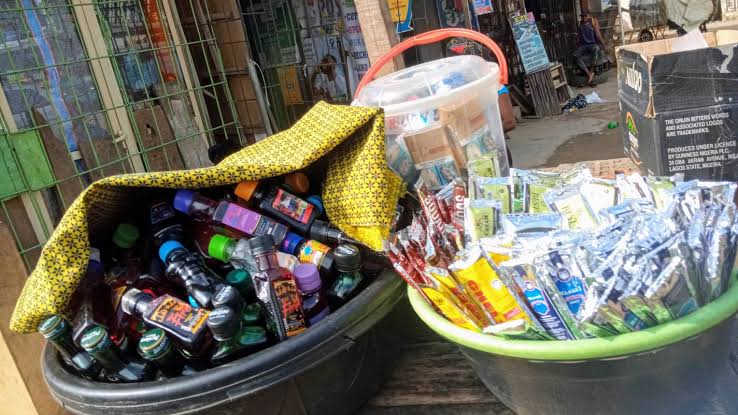Health experts, policymakers, and civil society actors have called for the urgent development of a national alcohol control policy, warning that Nigeria’s youths are at increasing risk of addiction and preventable deaths as sachet alcohol resurfaces in public spaces.
The call was made during a panel session at the MTN Anti-Substance Abuse Programme (ASAP) Advocacy Stakeholders Conference in Lagos. The session, themed “Turning the Tide: Multi-Sectoral Approaches into Substance Abuse and Recovery in Nigeria,” focused on the resurgence of sachet alcohol and illicit drugs and the absence of a coordinated national response to its growing abuse.
The United Nations Office on Drugs and Crime (UNODC) latest report revealed that over 14 million Nigerians are reportedly using illicit drugs. Speakers at the event emphasised that alcohol, though legal, remains the most abused and most culturally normalised substance, especially among young Nigerians.
A master trainer specialist on substance abuse and addiction with the UNODC, Olusesan Samuel-Kayode, lamented the return of sachet-packaged alcoholic drinks, particularly at bus parks and roadside kiosks, despite a previous ban by the National Agency for Food and Drug Administration and Control (NAFDAC).
“This is a silent epidemic. Until Nigeria develops a comprehensive alcohol policy that addresses access, especially among minors, alcohol will continue to destroy lives, even in primary schools,” Samuel-Kayode said.
He warned that children as young as 10 years now had access to cheap, potent alcoholic beverages, sometimes sold for as low as ₦100, due to poor enforcement and lack of unified legislation.
“Before we seek international collaboration, we must put our house in order,” he added, stressing the need for an internal, multi-sectoral approach involving government, civil society, and the private sector.
The deputy commander of Narcotics at the National Drug Law Enforcement Agency (NDLEA), Shehu Mohammed, acknowledged the regulatory gap surrounding alcohol. While the agency leads anti-drug operations, he noted that alcohol regulation does not fall exclusively under its jurisdiction.
“Alcohol remains one of the biggest threats to human life in this country. Its availability at motor parks, where drivers drink before or during trips, is directly linked to the high rate of road accidents. Drunk driving is responsible for nearly 50 percent of road fatalities globally. We need more than legislation; we need awareness and enforcement,” Mohammed said.
He urged a holistic, inter-agency strategy that includes not just the NDLEA, but also ministries of health, education, transport, and justice to tackle the root causes and consequences of alcohol and drug abuse.
The Lagos State House of Assembly deputy speaker, Hon. Mojisola Meranda, echoed the need for legislative action at both state and federal levels. She called for the domestication of the NDLEA Act in state assemblies and the development of alcohol-specific laws. “As lawmakers, we must recognise that substance abuse is not just a health issue, it is a developmental and security issue. We are seeing cases where primary school children are being used as drug couriers. The system is failing, and we must act now,” Meranda said.
She urged her colleagues in other state assemblies to introduce anti-drug bills and strengthen oversight functions to hold agencies accountable in curbing alcohol and substance abuse.
Professor Temitayo Adewuyi of Lagos State University’s Department of Psychology highlighted the cultural normalisation of alcohol as a major enabler of underage drinking. “We are in a third-generation crisis. Parents and children are now exposed to alcohol and other substances through ritualistic, recreational, and even medicinal practices. What was once sacred is now abused,” Adewuyi said.
She stressed that exposure to alcohol at a young age has neurodevelopmental consequences, especially when the brain is still forming, leading to addiction, academic decline, and risky behaviors later in life.
Chairman of the Nigerian Association of Clinical Psychologists (Lagos Chapter), Dr. Charles Umeh, linked alcohol and drug abuse to unresolved trauma, low self-esteem, and dysfunctional family environments. “Peer pressure is not the only culprit. Many young people turn to substances for temporary relief from emotional pain. The real driver is a lack of emotional regulation, often rooted in childhood trauma and broken homes,” Umeh explained.
He cited a recent study conducted by a PhD student under his supervision that found primary school children not just using, but selling psychoactive substances.
The Lagos State governor, Babajide Sanwo-Olu, reaffirmed the state’s commitment to mental health and substance abuse prevention.
“We are building the largest mental health institute in West Africa with 500 psychiatric beds and 1,000 rehab beds, scheduled for completion by December 2026,” Sanwo-Olu, who was represented at the conference by the secretary to the State Government, Bimbola Salu-Hundeyin, added.
Sanwo-Olu’s administration has also launched a mental health hotline, strengthened school counselling programmes, and initiated inter-agency collaborations to prevent substance abuse across schools and communities.
The executive director of the MTN Foundation, Odunayo Sanya, emphasised the role of corporate responsibility in combating drug abuse.
“For 20 years, MTN Foundation has invested over ₦33 billion in projects reaching 36 states and 3,600 communities. Our mission is to create a future that the Nigerian youth can thrive in, one free from the shackles of addiction,” Sanya stresses.
Sanya emphasised that MTN’s primary goal was to create a future the youths could thrive in, while commending the NDLEA and UNODC for their joint efforts in conducting awareness campaigns and sharing anti-drug abuse messages with students and teachers in schools nationwide. She urged students to become vanguards of the anti-drug abuse message within their communities.
NDLEA chairman, Brig. Gen. Buba Marwa (Rtd), also lent his voice to the call for prevention-first strategies, describing substance abuse as both a health crisis and a national security threat.
“With 14.4 percent of Nigerians aged 15–64 engaged in drug abuse, more than twice the global average, this is no longer a private issue. Substance abuse weakens families, fuels crime, and destroys generations. We must invest in prevention now or risk irreversible damage,” Marwa stated.
Stakeholders at the conference urged the federal government to convene an inter-ministerial task force, bring alcohol under the purview of coordinated drug policy, and launch a nationwide public awareness campaign to change social attitudes toward alcohol and substance abuse.
Until such steps are taken, experts warn that sachet alcohol and illicit drugs will continue to undermine Nigeria’s youth, public health, and road safety, with tragic consequences reverberating through homes, schools, and hospitals nationwide.





